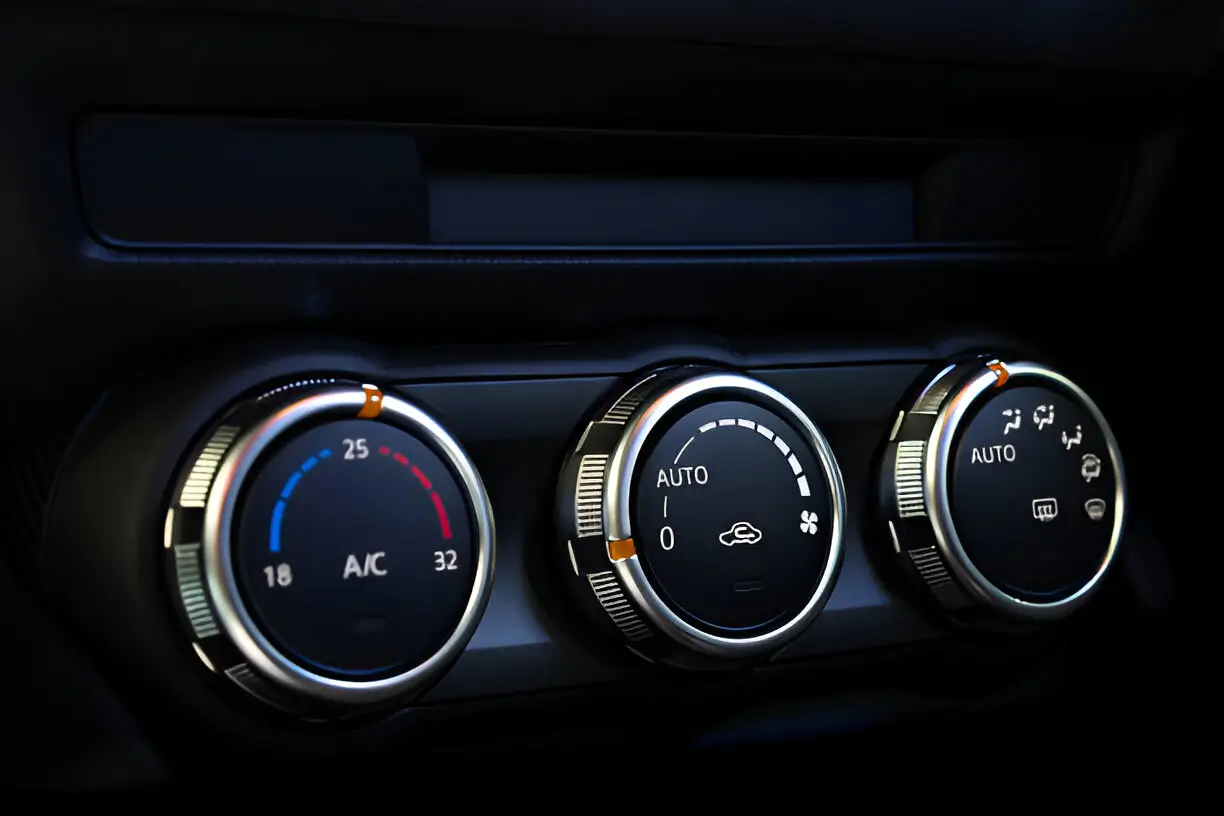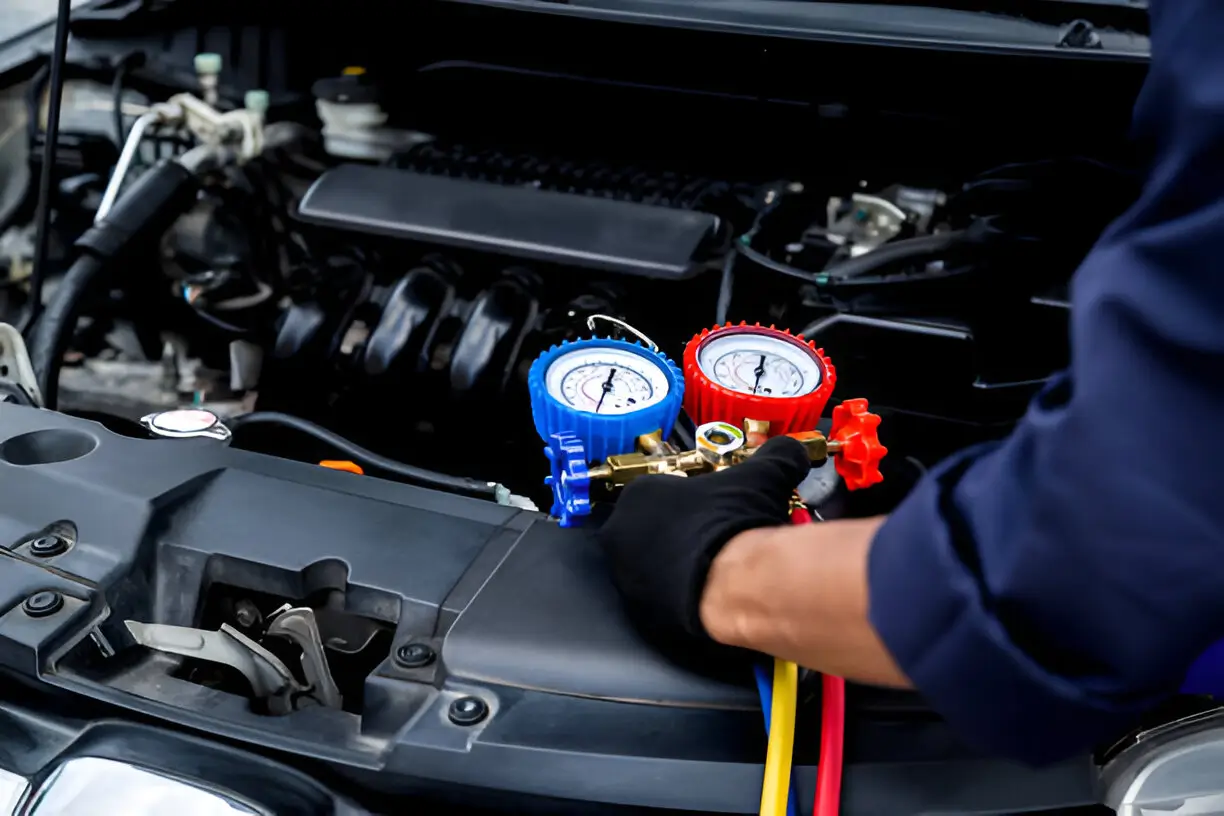Car Air Conditioning Repair Done Right at Trillium Auto
Air Conditioning Service in Hamilton
Your vehicle’s air conditioning system is essential for a comfortable driving experience, especially during hot weather.
At Trillium Auto, a trusted car service center in Hamilton, we offer comprehensive air conditioning services to ensure your system operates efficiently throughout the year.
If you need air conditioning repair or maintenance, our experienced team is ready to help. We provide high-quality service to keep you cool on the road.
Feel the Breeze, Beat the Heat
Key Benefits of Regular Air Conditioning Service
Consistent Cooling Performance: Regular service ensures your AC system cools efficiently, keeping the cabin at a comfortable temperature.
Improved Air Quality: Cleaning and sanitizing the system prevents mold and bacteria buildup, ensuring fresher and healthier air.
Prolonged System Life: Routine maintenance extends the life of your AC components, reducing wear and tear.
Cost Savings: Addressing minor issues early can help prevent larger, more expensive repairs in the future.
Common Signs Your Car’s Air Conditioning Needs Attention
Recognizing when your air conditioning system needs service can prevent more serious problems. Here are some signs that your vehicle’s AC may require professional attention:
Insufficient Cooling: If the air coming from your vents isn’t as cold as it should be, it may be due to low refrigerant, a faulty compressor, or a clogged condenser.
Unusual Noises: Strange sounds like grinding or rattling when the AC is running could signal a failing compressor or loose components.
Foul Odors: Musty or unpleasant smells can indicate mold or bacteria buildup in the evaporator or vents.
Water Stains or Leaks: Moisture or water stains inside your car might suggest a clogged or leaking AC drain line.
Frequent Cycling: If your AC turns on and off often, it could be a sign of electrical issues or a malfunctioning sensor.
Cool Comfort, Year-Round
The Importance of Auto Air Conditioning Service
Your vehicle’s air conditioning (AC) system does more than just cool the air. It also dehumidifies, improving comfort and safety by reducing foggy windows.
With time, your AC system may face issues like leaks, refrigerant loss, or mold buildup. Regular air conditioning service helps maintain peak performance, prevents costly repairs, and ensures that you enjoy fresh, cool air inside your vehicle.

Years of Experience

Expert AC Service at Your Service in Hamilton
Comprehensive Air Conditioning Services at Trillium Auto
System Inspection and Diagnostics
Our technicians perform a thorough inspection to identify any issues, including checking refrigerant levels, compressor function, and electrical connections.
Refrigerant Recharge
We check and refill refrigerant levels to ensure optimal cooling. Low refrigerant may be caused by leaks or natural depletion over time.
Leak Detection and Repair
We use advanced leak detection tools to identify and fix any leaks in the system, preventing refrigerant loss and ensuring efficient performance.
Compressor and Component Replacement
If needed, we replace faulty parts like the compressor, condenser, or expansion valve to restore your AC system’s full functionality.
System Cleaning and Sanitization
We thoroughly clean the evaporator and ducts to remove mold, bacteria, and unpleasant odors, ensuring fresh and clean air circulation.
Performance Testing
After completing the service, we run the system to verify that everything is functioning efficiently and cooling effectively.
How Our Car Garage Takes Care of You
10 Steps Involved in an AC System Inspection
1. Visual Inspection
The technician visually inspects the AC system components, including the compressor, condenser, belts, hoses, and connections, for any signs of wear, damage, or leaks.
2. Refrigerant Level Check
The refrigerant levels are checked to ensure they meet the manufacturer’s specifications.
Low levels may indicate a leak or natural depletion over time.
3. Compressor Function Test
The compressor is tested to ensure it is engaging properly and circulating the refrigerant as needed.
A faulty compressor can significantly impact the AC’s cooling performance.
4. Pressure Reading
The technician measures the pressure in the system using specialized gauges.
This helps identify issues with refrigerant flow or potential blockages within the system.
5. Leak Detection
Advanced leak detection tools, such as UV dye or electronic detectors, are used to check for refrigerant leaks.
Leaks can decrease cooling efficiency and negatively impact the environment.
6. Condenser and Evaporator Inspection
These components are examined for blockages, damage, or buildup of debris.
A clogged or damaged condenser or evaporator can reduce cooling efficiency.
7. Cabin Air Filter Check
The condition of the cabin air filter is checked.
A dirty or clogged filter can restrict airflow and reduce the AC system’s effectiveness.
8. Blower Motor Test
The blower motor and fan are checked to ensure they are functioning properly.
They need to provide adequate airflow to the cabin.
9. Temperature Test
The technician measures the temperature of the air coming from the vents to ensure the AC is cooling as expected.
Any discrepancy may indicate an issue with the system’s performance.
10. Electrical Component Check
The electrical parts of the AC system are checked, including the wiring, fuses, and relays.
These checks ensure that everything functions properly and powers the system effectively.
Learn more about our services
Trillium Auto ensures your vehicle receives the expert care it deserves.
Oil change service
Tires and Wheels
General Maintenance
Car air conditioning repair
The Value of Preventative Maintenance for Your AC System
Regular maintenance for your car’s air conditioning system can save you both time and money. Here’s why routine service is crucial:
Prevents Refrigerant Leaks: Regular inspections help identify early signs of leaks, preventing refrigerant loss and maintaining your AC’s performance.
Protects the Compressor: The compressor is one of the most costly components to replace. Consistent maintenance ensures its optimal performance, preventing expensive repairs.
Maintains Comfortable Driving Conditions: Reliable cooling is essential for comfort, particularly during hot weather or long drives. Regular service ensures your AC performs well all year long.
Reduces Allergens: Cleaning and sanitizing the AC system helps eliminate allergens, dust, and pollutants, contributing to a cleaner and healthier cabin environment.
DIY Tips to Maintain Your Vehicle’s Air Conditioning System
While professional AC service is essential, you can take simple steps to maintain your system between visits:
Run Your AC Regularly: Even in colder months, run your AC for a few minutes to keep the compressor engaged and prevent seals from drying out.
Keep the Cabin Filter Clean: Regularly replace or clean your cabin air filter to ensure proper airflow and reduce stress on the AC system.
Park in the Shade: Park in shaded areas or use a sunshade to keep your car’s interior cooler, easing the load on your AC system when you start the car.
Check for Unusual Smells: If you notice any musty or unpleasant odors when you turn on the AC, it could indicate mold or bacteria buildup, signaling the need for a professional inspection or cleaning.
Auto Air Conditioning Service with Trillium Auto
FAQs | Air Conditioning Service in Hamilton
How often should I service my car's air conditioning system ?
It’s recommended to service your car’s air conditioning system at least once a year. Regular annual maintenance helps maintain peak cooling performance, prevent significant issues, and ensures the system runs efficiently.
Scheduling a check before warmer months ensures it’s in top condition for summer. However, if you notice reduced cooling, strange noises, or unpleasant odors, it’s best to have it inspected promptly, no matter when it was last serviced.
What causes my car's AC to blow warm air ?
Several factors can cause your car’s AC to blow warm air:
Low Refrigerant Levels: The most common cause is low refrigerant, either from leaks or natural depletion. Without enough refrigerant, the system can’t cool the air effectively.
Compressor Issues: A damaged or failing compressor may fail to circulate refrigerant properly, resulting in warm air.
Clogged Condenser: The condenser cools the refrigerant by releasing heat. If it’s blocked or damaged, it can’t perform this function, leading to warm air.
Faulty Cooling Fans: If the fans responsible for cooling the condenser aren’t working, the AC system won’t cool the air efficiently.
Electrical Issues: Problems with wiring, fuses, or connections can prevent AC components from functioning properly, leading to warm air.
Broken or Malfunctioning AC Parts: Damaged components like the expansion valve or receiver/drier can hinder the system’s ability to cool the air.
If your AC starts blowing warm air, it’s essential to have it inspected by a professional to determine the cause and address it swiftly.
Why does my car's AC emit a bad smell ?
A bad smell from your car’s AC can be caused by several factors:
Mold and Mildew Growth: The most common cause is mold or mildew buildup in the evaporator or vents. This happens when moisture accumulates in the system, creating a breeding ground for bacteria and fungi, which results in a musty odor.
Dirty or Clogged Cabin Air Filter: The cabin air filter traps dust, pollen, and other contaminants. When it becomes clogged or dirty, it can emit unpleasant odors and impact the air quality inside your vehicle.
Bacteria in the Evaporator Coil: Over time, bacteria can develop on the AC’s evaporator coil, especially if the system isn’t used regularly, leading to foul smells.
Leaking or Spilled Refrigerant: A sour or chemical-like smell could indicate a refrigerant leak, which requires immediate attention as it can harm both the environment and your AC system’s performance.
Decaying Organic Matter: Leaves or debris trapped in the AC system or vents can decay over time, causing unpleasant odors.
To eliminate bad smells from your car’s AC, it’s essential to clean or replace the cabin air filter, have the system cleaned, or seek professional inspection and servicing if the smell persists.
Can using my car's AC in the winter damage it ?
No, using your car’s AC in the winter does not damage it; in fact, it’s actually beneficial. Running your AC during the colder months helps keep the system functioning properly by engaging the compressor and lubricating the seals. This prevents them from drying out and cracking, which could lead to refrigerant leaks and decreased performance over time.
Additionally, using the AC in winter helps dehumidify the air inside your vehicle, which is effective in preventing the windows from fogging up and improving visibility. Regularly running the AC ensures that the system stays in optimal working condition throughout the year.
Can I use my car's air conditioning in winter ?
Yes, you can and should use your car’s air conditioning in winter. Running the AC during the colder months offers several advantages:
Prevents Moisture Build-Up: The AC dehumidifies the air inside your car, which is especially helpful in winter when windows tend to fog up. This improves visibility and overall safety while driving.
Maintains System Health: Periodically using the AC keeps the compressor engaged and the seals lubricated, preventing them from drying out and cracking, which can lead to refrigerant leaks and costly repairs.
Improves Defogging Efficiency: Running the AC with the heater helps clear foggy windows faster by removing moisture from the air inside the vehicle.
Using the AC in winter won’t damage the system; in fact, it helps ensure it stays in good working condition throughout the year.
How long does an air conditioning service typically take ?
An air conditioning service typically takes about 1 to 2 hours, depending on the complexity of the service and the condition of the AC system.
A standard service, which includes inspection, refrigerant recharge, and basic maintenance, usually takes around an hour. However, if repairs are required—such as fixing leaks, replacing components, or conducting more detailed diagnostics—the service may take longer.
For a more precise time estimate, it’s best to consult with your car service provider, particularly if specific repairs or issues are involved.
What is a refrigerant recharge and is it necessary ?
A refrigerant recharge involves replenishing the refrigerant in your vehicle’s air conditioning system, which is responsible for cooling the air inside. Over time, refrigerant levels can drop due to leaks or natural depletion, diminishing the AC system’s cooling efficiency.
Is it necessary?
Yes, a refrigerant recharge is essential when your AC isn’t cooling properly or airflow is weak. Without adequate refrigerant, the system can’t effectively remove heat from the cabin, leading to warm air instead of cold.
Recharging restores the system to optimal performance and helps protect the compressor, as low refrigerant can cause it to overheat and potentially fail. During the recharge, technicians also check for any leaks or issues that may have led to refrigerant loss in the first place.
Why is my car's AC making a strange noise ?
If your car’s AC is making unusual noises, several common issues could be the cause:
Worn or Damaged Compressor: The compressor pressurizes and circulates the refrigerant. If it’s worn out or damaged, you may hear rattling, grinding, or squealing sounds.
Faulty AC Clutch: The clutch engages and disengages the compressor. A malfunctioning clutch can produce clicking or clunking sounds when the AC is turned on.
Loose or Damaged Belts: Belts connected to the AC system can become loose, cracked, or worn, leading to squealing or chirping noises.
Debris in the System: Leaves or other debris trapped in the AC vents or blower fan can cause rattling or fluttering noises.
Worn Bearings: Bearings in the compressor or other parts can wear out, causing grinding or groaning noises.
Low Refrigerant Levels: Low refrigerant can cause the system to struggle, leading to hissing or squealing noises as the pressure fluctuates.
Leaking or Malfunctioning Components: A refrigerant leak or malfunctioning valve can produce hissing sounds, especially when the AC is turned off.
If you hear any of these noises, it’s important to have the system checked by a professional technician to avoid further damage and costly repairs.
Can I drive with a malfunctioning AC system ?
Do you offer warranties on AC repairs ?
Air Conditioning Service in Kitchener at Trillium Auto
Don’t let a malfunctioning air conditioning system ruin your driving experience. Regular air conditioning service not only ensures a cool, comfortable ride, but it also helps extend the lifespan of your vehicle’s AC components.
If you’re looking for “air conditioning service” or “car air conditioning repair” at a trusted service center in Kitchener, look no further than Trillium Auto. Our expert technicians are here to provide detailed inspections, repairs, and maintenance to keep your vehicle’s AC system in top shape.
Visit us or schedule an appointment online today to experience exceptional service.
